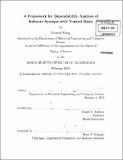A Framework for Dependability analysis of software systems with trusted bases
Author(s)
Kang, Eunsuk
DownloadFull printable version (7.486Mb)
Other Contributors
Massachusetts Institute of Technology. Dept. of Electrical Engineering and Computer Science.
Advisor
Daniel N. Jackson.
Terms of use
Metadata
Show full item recordAbstract
A new approach is suggested for arguing that a software system is dependable. The key idea is to structure the system so that highly critical requirements are localized in small subsets of the system called trusted bases. In most systems, the satisfaction of a requirement relies on assumptions about the environment, in addition to the behavior of software. Therefore, establishing a trusted base for a critical property must be carried out as early as the requirements phase. This thesis proposes a new framework to support this activity. A notation is used to construct a dependability argument that explains how the system satisfies critical requirements. The framework provides a set of analysis techniques for checking the soundness of an argument, identifying the members of a trusted base, and illustrating the impact of failures of trusted components. The analysis offers suggestions for redesigning the system so that it becomes more reliable. The thesis demonstrates the effectiveness of this approach with a case study on electronic voting systems.
Description
Thesis (S.M.)--Massachusetts Institute of Technology, Dept. of Electrical Engineering and Computer Science, 2010. Cataloged from PDF version of thesis. Includes bibliographical references (p. 73-76).
Date issued
2010Department
Massachusetts Institute of Technology. Department of Electrical Engineering and Computer SciencePublisher
Massachusetts Institute of Technology
Keywords
Electrical Engineering and Computer Science.